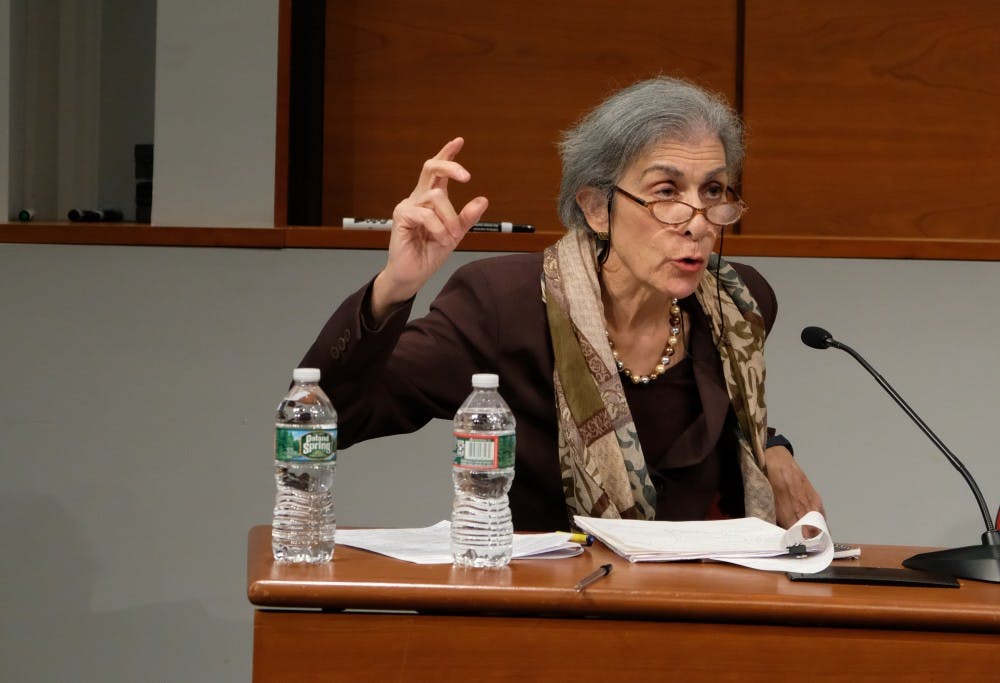Penn Law Professor Amy Wax has come under fire this past week for advocating for a “cultural distance nationalism” at the National Conservatism Conference, where, according to a Vox reporter, she stated that “our country will be better off with more whites and fewer nonwhites.” This is not the first time that Wax has made comments of this variety. In an op-ed published two years ago, she advocated for a return to the ideals of the bourgeois, white culture of the 1950’s, while sharply criticizing “the anti-‘acting white’ rap culture of inner city blacks [and] the anti-assimilation ideas gaining ground among some Hispanic immigrants.”
Wax is completely within her rights to express her views publicly and in her publications. Her behavior does not warrant termination as per the University’s Faculty Handbook, and in fact the position of tenure she earned at Penn Law is designed to protect her in situations precisely like this one. However, although expressing her views is not against University policy, such views do go against the University’s values, and are in fact the antithesis to the spirit that has animated this institution for the past 279 years.
The crux of Wax’s beliefs on immigration is that some cultures are better than others; in particular, that the traditional values of marriage, education, and patriotism of white America are the only way to social success today. There are no hard numbers that can be put forth that provide a convincing argument for or against Wax’s views. And yet, regardless of what those numbers say, to believe that one’s culture or background is superior to another serves only to damage the pursuit of knowledge that is so central to this school’s mission. It is innovation, not conformity, that drives scientific and social progress. If everyone in higher education subscribed to the same set of cultural norms, the same way of thinking or acting, the result would not be prosperity but stagnation. In her op-ed in the Wall Street Journal, Wax lamented the fact that academia is limited by a dominant culture of progressivism. If she believes that her minority beliefs have value for the field of academia, then she ought to also believe that the different ways of thinking and acting found in minority cultures have intrinsic value, too.
Wax has also made the claim that her views are not racist because her views on nonwhite immigrants are based on their culture rather than their biology. And yet, in a 2018 paper, Wax explained that, to a cultural nationalist like herself, “cultural commitments and mindsets are imbibed over generations, cultivated and habituated over time, and transmitted through mysterious mechanisms of family.” By describing culture as something that is “passed down” and “transmitted” through family structures, she illustrates it as something that is inherently biological. Culture, according to Wax, is something so inextricably linked to one’s parentage that it might as well be written in one’s DNA. However Wax justifies her argument, it is clear that she is not supportive of those who fail to subscribe to the script of white heteronormativity. Those views are blatantly incongruous with an institution that claims that its “special character is reflected in the diversity of the Penn community.”
But perhaps the biggest black mark against Wax and her views are that they have tangible human cost, a cost which she herself has acknowledged. “Difficult decisions must be made,” wrote Wax in 2018 on immigration. “Some families will be broken up, even as others are kept together. Some people will be allowed to stay, but others will have to go. Not everyone can be held entirely harmless.” This statement finds many echoes in the Trump administration’s current immigration policy, and seems to endorse some of its most morally repugnant actions. Given that the paper I’m citing was published several months after the announcement of President Trump’s family separation policy, the mention of breaking up families seems particularly insensitive and indefensible. Yes, when it comes to the issue of immigration, the letter of the law should not be ignored. And yet, the law should not be applied so harshly and so ruthlessly that it precipitates a veritable humanitarian nightmare on our country’s borders. In light of this current crisis, Wax would do well to remember this school’s motto: leges sine moribus vanae.
Ultimately, Wax has the right to express her views, and her tenureship ensures that she may do so without fearing the loss of her position. But even so, Wax is a representative of this university. Wax argued in her 2017 speech to Penn Law that no one imagines that one professor speaks for the entire university. But, as recent headlines demonstrate, Wax’s views do not reflect upon her character alone. They serve as a reflection of the character of Penn, both as an institution and a community. By taking a position at Penn, Wax has joined a community of students and scholars, that, although diverse in thought and culture, have agreed to abide by a set of guiding principles. As part of the Penn community, she should start abiding by those principles, too.

JAMES MORRISON is a College sophomore from Pipersville, Pa. studying English. His email address is jmorr2@sas.upenn.edu.
SEE MORE FROM JAMES MORRISON:
Joe Biden needs to earn his salary
Penn needs to make it easier for students to explore its four schools
SEE MORE FROM JAMES MORRISON:
Joe Biden needs to earn his salary
Penn needs to make it easier for students to explore its four schools









